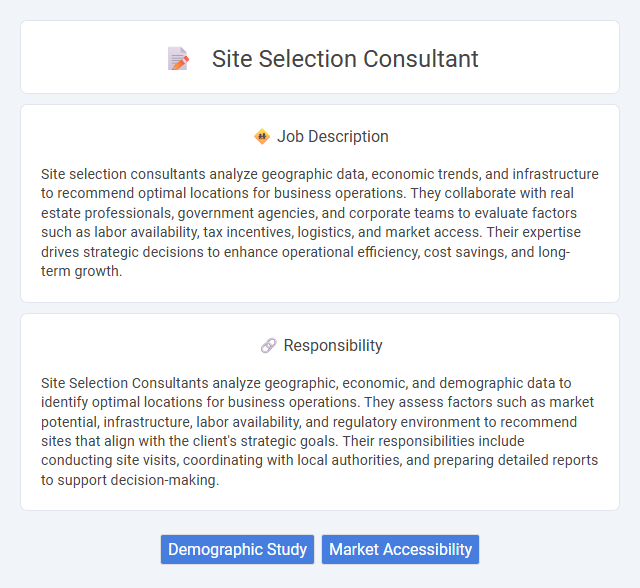
Site selection consultants analyze geographic data, economic trends, and infrastructure to recommend optimal locations for business operations. They collaborate with real estate professionals, government agencies, and corporate teams to evaluate factors such as labor availability, tax incentives, logistics, and market access. Their expertise drives strategic decisions to enhance operational efficiency, cost savings, and long-term growth.
Individuals with strong analytical skills and an aptitude for research are likely well-suited for a Site Selection Consultant role, as the job demands evaluating various locations based on economic, demographic, and logistical conditions. Candidates who thrive in dynamic environments and possess excellent communication skills may find it easier to collaborate with stakeholders and present compelling recommendations. Those lacking attention to detail or discomfort with travel might face challenges adapting to the responsibilities inherent in this position.
Qualification
A Site Selection Consultant typically requires a strong background in real estate, urban planning, or economic development, combined with expertise in market analysis and geographic information systems (GIS). Proficiency in data-driven decision-making, negotiation skills, and knowledge of zoning laws and infrastructure requirements are essential for evaluating potential locations effectively. Experience working with corporate clients to align site attributes with business objectives enhances success in identifying optimal sites for expansion or relocation.
Responsibility
Site Selection Consultants analyze geographic, economic, and demographic data to identify optimal locations for business operations. They assess factors such as market potential, infrastructure, labor availability, and regulatory environment to recommend sites that align with the client's strategic goals. Their responsibilities include conducting site visits, coordinating with local authorities, and preparing detailed reports to support decision-making.
Benefit
Hiring a site selection consultant increases the probability of identifying optimal locations for business expansion by leveraging data-driven analysis and industry expertise. This expertise often leads to cost savings through reduced risks and improved negotiation strategies. Clients can likely expect enhanced decision-making processes that contribute to long-term operational efficiency and competitive advantage.
Challenge
Site Selection Consultant roles likely involve navigating complex factors such as geographic, economic, and regulatory challenges to identify optimal locations for businesses. The position may require analyzing diverse data sets under uncertain conditions to recommend sites that balance cost, accessibility, and strategic potential. Success in this job probably depends on effectively managing competing priorities and adapting to changing market dynamics.
Career Advancement
Site selection consultants leverage data analysis and market research to identify optimal locations for business expansion, driving strategic growth opportunities. Expertise in geographic, economic, and demographic trends enhances their value, opening pathways to senior roles in corporate real estate, economic development, or project management. Continuous skill development in GIS technology and negotiation further accelerates career progression within consultancy firms or multinational corporations.
Key Terms
Demographic Study
A Site Selection Consultant specializing in Demographic Study analyzes population data, economic trends, and consumer behavior to identify optimal locations for business expansion or new facility development. This role involves interpreting census data, market surveys, and regional statistics to assess target market potential and workforce availability. Accurate demographic insights drive strategic decisions, ensuring site choices align with client growth objectives and operational efficiency.
Market Accessibility
Site Selection Consultants analyze geographic and economic data to identify locations with optimal market accessibility, ensuring businesses reach target audiences efficiently. They evaluate transportation infrastructure, proximity to key markets, and regional demand patterns to recommend sites that maximize distribution potential and customer engagement. Expertise in market accessibility enables these consultants to support strategic decisions that enhance competitive advantage and operational logistics.
 kuljobs.com
kuljobs.com